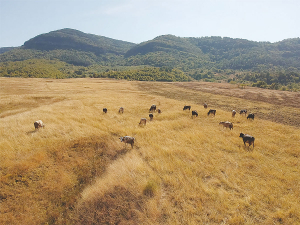Managing Magnesium, Calcium, and Phosphorus in Late Lactation Dairy Cows
OPINION: Late lactation is often viewed as a low-demand phase, when cows are winding down, and we dial down our supplements accordingly.
 Heat stress in cows occurs when they are producing more heat than they are able to get rid of through sweating, respiration, or air regulation.
Heat stress in cows occurs when they are producing more heat than they are able to get rid of through sweating, respiration, or air regulation.
Heat stress in dairy cattle is probably the most overlooked seasonal problem here in New Zealand.
Production drops rapidly as the heat increases, and most farmers simply accept this as a normal seasonal issue that they are powerless to address.
The truth is, there are a number of nutritional strategies that can be used in order to mitigate the effects of heat stress.
It is a well-known fact that cows generate heat in order to create the energy to produce milk, and during the summer this will be out in the paddock in the heat of the sun. Heat stress in cows occurs when they are producing more heat than they are able to get rid of through sweating, respiration, or air regulation.
An overabundance of heat in cows can lead to higher levels of stress, which will affect milk production, fertility, as well as increase the risk of other diseases such as lameness, and can also impair immune function.
Untreated heat stress can be fatal, which is why it’s vital to understand the signs of heat stress, and the best ways in which to prevent it. Watch for changes in behaviour, such as seeking shade, panting, drooling, and standing in water or next to troughs, as signs that your cows may be experiencing heat stress.
When cows are suffering heat stress, feed intake is reduced. This will be accompanied by increased panting and drooling culminating in less saliva reaching the rumen, this decreases rumination by disrupting rumen pH. A healthy rumen is needed for milk yield as well as animal health.
It is therefore important that ruminant animals during periods of high humidity are provided with sufficient nutrients in order to counteract heat stress and maintain strong immunity.
By providing your herd with an easily digestible, nutrient-packed animal tonic that can be blended easily into their feed or added into their water, you ensure that they have the correct balance in place to mitigate the effects of this summer heat stress.
Chris Balemi is managing director, Agvance Nutrition Ltd
Donald Trump's latest tariff tantrum has again thrown the world of trade into a new round of turmoil and uncertainty, and NZ is caught up in it.
The third edition of the NZ Dairy Expo, held in mid-February in Matamata, has shown that the KISS principle (keep it simple stupid) was getting a positive response from exhibitors and visitors alike.
Twenty years ago, South African dairy farm manager Louis Vandenberg was sent to a farm in Waikato to provide training on Afimilk technology.
Strong farmgate milk price is helping boost investment on farms, says PGG Wrightson chief executive Stephen Guerin.
Fonterra's 460 milk suppliers in Australia, who will switch to Lactalis end of this month, are unfazed with the impending change.
The 5+ A Day Charitable Trust has launched a collection of affordable recipes designed to turn everyday vegetables into seasonal stars.
OPINION: Is it a case of over promising and under delivering? Farmers think so.
OPINION: The UK dairy industry is celebrating a win after plant-based drink maker Oatly lost a long-running legal battle over…